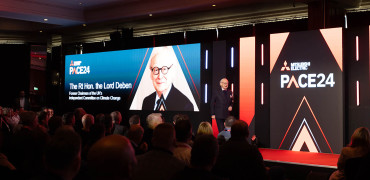M&E contractors are at the forefront of the UK’s low-carbon heating revolution. Dave Archer considers the potential impact of our switch to heat pump technology.
The UK has set itself a target of net zero carbon emissions by 2050. One of the most significant areas to address so that we can achieve that goal is our reliance on fossil fuels, such as gas, for heating our buildings and producing hot water.
We must shift away from fuels such as gas and oil if we are to achieve our carbon objective.
In its report Clean Growth: Transforming Heating, the Department for Business, Energy and Industrial Strategy (BEIS) states:
“Heat is the largest energy-consuming sector in the UK today. Whilst progress has been made to reduce demand for heat, and further reductions will be delivered through improvements to the energy efficiency of our buildings and industrial processes, the remaining heat demand must be met by low carbon sources if we are to meet our legally binding emissions reduction commitment.”
Heat pump technology has advanced and can now produce hot water up to 90 degrees C
The end of gas
Gas heating and hot water systems have a long history in the UK. For decades, we have relied on gas-fired boilers as the source of space heating and domestic hot water in our schools, universities and hospitals (as well as in our homes and workplaces).
But in the past few years, the UK’s energy profile has changed. The growing use of renewables such as wind, solar and biomass means that electricity is an increasingly low-carbon energy. At one point in 2020, renewables were providing almost 70% of the country’s electricity, making it one of the ‘cleanest’ energy years on record for the UK.
So, it makes sense to look at ways to use electricity to provide heating and hot water, and to shift away from fossil-fuel based systems wherever possible. Changing to new approaches can be challenging, but there are technologies on the market that make switching away from gas very much easier.
The future of heating
Heat pumps are an obvious low-carbon heat solution for domestic and commercial projects. The government’s Green Industrial Revolution document set a target of 600,000 heat pump installations per year from 2028.
It is not an easy task, but heat pump technology is also increasingly supported by government grants such as the Boiler Upgrade Scheme (BUS) which was recently boosted for domestic customers. And the Public Sector Decarbonisation Scheme (also known as the Salix Scheme or PSDS) is to support buildings such as schools looking to switch out gas boilers for heat pumps.
Heat pump technology itself has also advanced. At Mitsubishi Electric, we have spent time and effort to create solutions for a range of heating needs whether domestic or commercial. One example is our QAHV heat pump that can produce hot water up to 90oC at scale for high-demand projects such as hotels or gymnasiums.
Training confidence
At the same time, we have developed our use of low-GWP refrigerants for domestic and commercial heat pumps so that designers can hit their embodied carbon targets too. Mitsubishi Electric offers training courses on our range of Ecodan heat pumps to ensure installers are confident in applying our products.
Heat pump technology itself is relatively simple, but helping clients move away from the familiar solutions of the past requires an approach based on education and advice. This is where contractors can really make an impact, providing their practical advice not just on equipment choice, but also on how to make the most out of system performance over time.
Contractors are at the forefront of the UK’s low-carbon heating revolution in homes and non-dwellings. By advising clients and customers, they can help to reduce the UK’s reliance on gas and oil for heating and hot water.
If you’d like to find out more about our products and training courses, check out our website:
Dave Archer is Business Manager - Influenced Sales




